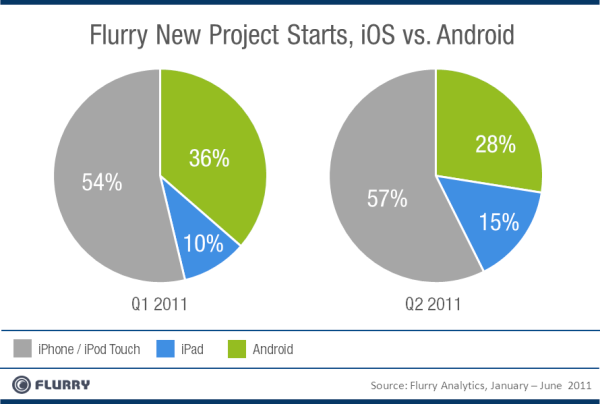Which matters more to you, Android or iOS? [poll]

Yesterday's Flurry blog post "iPad 2 and Verizon iPhone Take Some Wind Out of Android's Sail" sent the Apple Fanclub of bloggers and journalists into a tizzy. They're still blogging about this great news today. But is it really so great?
I don't think so, because the data is limited in reach and the analysis supporting it overlooks too much. So I'm asking for your help in getting different perspective. If you develop for multiple mobile operating systems, please tell us which matter more to you -- in comments or by sending email to joe at betanews dot com. I'll explain more in the closing paragraphs. Meanwhile please answer the two polls below -- one for developers and another for mobile device buyers (which could be developers, too).
Flurry's Charles Newark-French claims that "it's readily apparent that Android has lost developer support to iOS. Specifically, Android new project starts have dropped from 36 percent in Q1 to 28 percent in Q2". Wow, that is a big number. "Overall, total Flurry iOS and Android new project starts grew from 9,100 in Q1 to 10,200 in Q2. Of note, this drop in Android developer support represents the second quarter-over-quarter slide, which follows a year of significant, steady growth for the Google-built OS. Over the course of 2010, Android developer support had steadily climbed each quarter, peaking at 39 percent in Q4 2010".
That does seem damning now. Or does it? "In total, over 45,000 companies use Flurry Analytics across more than 90,000 applications", Newark-French writes. That sure seems like a big sample size. Together, Apple's App Store and Google's Android Market are closing in on 700,000 apps. So the sample represents about 12 percent of the total, assuming this: "When companies create new projects in Flurry Analytics, they download platform-specific SDKs for their apps". So, essentially, the sample reflects Flurry customers, but not necessarily the larger mobile app development market.
Newark-French cites the launches of Verizon iPhone in February and iPad 2 in March as reasons for the slowdown in new Android app starts. I find iPad much more plausible than Verizon iPhone. Verizon is one carrier in one geography, and iPhone 4 sales already were strong beforehand, globally. But iPad is different. Even before v2 launched, I talked to several developers making apps for iOS and repeatedly asked: "What next?" Should they develop for iPad or Android phones? iPad 2 gave many developers an answer, exacerbated by the sluggish start of Android 3.0 "Honeycomb" tablets.
What makes as much, if not more, sense is information Flurry didn't have yesterday. After the stock market closed, Google announced second quarter earnings results. During the conference call, CEO Larry Page said there are 135 million active Android devices, which is substantially less than Apple's 200 million active iOS devices. He also said that Android activations are now 550,000 a day. Less than three weeks ago, the number was 500,000 a day.
So iOS is the larger platform -- something many developers would already know from their app stats. Developers follow the money, as they should, and iOS' size and other attributes, such as percentage of paid apps and success of in-app purchases, are compelling, too. However, Apple's platform gets a big kick in the rear from iPad and iPod touch. Those 550,000 activations a day put Android sell through at more than twice that of iPhone. How much or little that could change will be revealed on Tuesday, when Apple announces second calendar quarterly results.
Something else, which Flurry's analysis ignores: Android is going through a major transition leading up to release of Ice Cream Sandwich, which will bring together Android 2.x for phones and 3.x for tablets. Many developers may simply be shifting resources where they're most meaningful now, working to get their iOS apps primed for v5 in the present and waiting on new Android starts until Ice Cream Sandwich is ready to eat. That has little to nothing to do with iPad 2 or Verizon iPhone.
More likely, there are several reasons, and I'm thinking iPad 2 launch and Ice Cream Sandwich transition together are primaries. For developers answering the "What next?" question, iOS is more obvious choice while waiting for Ice Cream Sandwich, which is far from Flurry's claim that "Android has lost developer support to iOS".
The winds behind the sails can easily shift. In December, the number of Android activations per day was 300,000, and 400,000 in May. Now, the number is 550,000 in mid July. It's simply monstrous momentum. What happens when that number is 700,000, which conceptually is just months away? Or will iOS 5's and iPhone 5's autumn launches pull developers there? What about Ice Cream Sandwich? How will developers shift resources for that, if at all? Or you could answer the most basic question: Which matters more to you, Android or iOS? And explain why.
These are the questions I'd like you to help answer in comments or by emailing joe at betanews dot com. Please also respond to the two polls.
